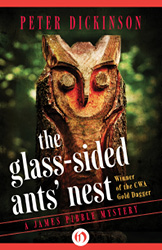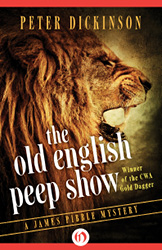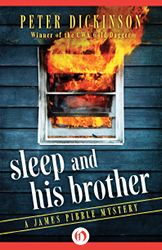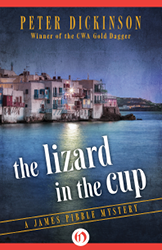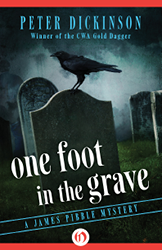The Old English Peep Show (21 page)
Read The Old English Peep Show Online
Authors: Peter Dickinson

Never mind. It might be true, but nothing would ever prove it. If it was, she would take vengeance again, on herself. Pibble shivered. His thought processes were becoming very dim; he went over the same point several times before he could bully his brain into moving on. She'd never called him anything except “General,” not once, had she? Yes, once, when she was playing the apologetic hostess after the first attempt at murdering Pibbleâand even then she'd stumbled over it. And ⦠and ⦠something else ⦠yes, the General had said she'd been very “cut up” about the Admiral's death ⦠except that she mostly called him “Uncle Dick” ⦠cozier ⦠and the fierce bad blood between the old heroesâit'd account for that, too ⦠you randy old bastard ⦠these last years Dick and I managed to steer dear of each other's obsessions ⦠neither of them ever loved anyone else, I think (but that was Miss Finnickâlet's leave her out of this) ⦠Ah, give it up, leave it to whoever comes to take over. He dozed.
Almost at once something rattled against the window behind him. Two police cars stood out on the gravel; several torches probed the sky in a toy searchlight display; a man was bending in the drive for another handful of gravel to throw. Pibble's voice was disappearing again, but by signs and painful whispers he got the group to wait and then went around and discovered the door and flight of steps down which the General had strutted a whole afternoon ago. He led his reinforcements back into the study and addressed them. His tiredness and his damaged throat made him sound like the Ass. Com., much more impressive than if he'd been in full possession of his larynx. First a brief jeremiad about what would happen to any officer who was found to have communicated with the press; then a brief assignment of dutiesâtwo poor sods to go and guard the Tiger Pit, one to watch in the Chinese Room in case anyone tried to nobble the Colt, two down on the Gallows Ground to prevent the day staff mucking the detail up, one to go through Singleton's papers and try and warn the agency responsible for tomorrow's visitors, one on the top landing to guard the Admiral's quarters and Deakin's, a car waiting this end, another over at the staff car park. He marked maps (third drawer down on the left) for the outliers, took the house party around to their posts, and went back to his dozing on the study sofa, his ears full of a noise like the mains hum on an old radio.
When he woke, it was light; his neck was locked as stiff as
rigor mortis.
Miss Scoplow was already in the office, happy (for the moment) in a torrent of efficiency as she tried to persuade sleepy young men in Southampton that there were other things for ten coachloads of newly landed tourists to do than visit Herryngs. She bit her Biro, made accurate notes about money refunds, cooed, and cajoled. The sergeant who had made no progress in the night, having been wrongly told by Pibble to try London, gawped at her in sleepy adoration. Elsa evolved a vast breakfast and stalked furiously around the house with salvers of grilled kidneys while coppers cringed and mumbled. Mrs. Singleton stayed in bed.
Pibble mooned unhappily about, hankering for pity, dimly trying to think of an excuse to interview Miss Finnick again. Mr. Chanceley was out, the hotel said, doing the rounds of local photographic shops. The day was clear and chill, spendthrift with the last gold of summer. The hospital was cagey about Mr. Waugh's chances.
He found the control switch for the fountain in a little mahogany box just inside the main entrance, and moodily began to spell out his own name in wet, twenty-foot-high, ultra-slow Morse. He'd got as far as the second “B” when there was a hooting and a puff of dust down at the far end of the drive, where the enormous perspective of limes almost met in a point. Rapidly a cavalcade of cars, four of them, rushed toward him, swooped around the pool, and braked at the bottom of the steps. No door opened until the fourth car was still, and then all eight doors of the hinder two cars flapped forward, like the wing carapaces of beetles, and a squad of men, bearded and corduroyed and draped with the glistening gadgets of their profession, poured out and knelt or squatted or lay around the base of the steps. Only when they were ready did one door of the front car open and a man step nonchalantly out. Immediately all the cameras started to click and buzz. Head bowed, the man walked somberly up the first three steps; then, as if he'd remembered something important, he turned and barked an order to the police cars, holding his head at just the right angle for the cameras to catch the iron jaw and eagle profile.
Pibble remembered reading about an odd phenomenon of the desert; you never see more than one vulture at a time patrolling its patch of sky, an almost invisible scratch on the blueness; but when it begins to spiral down toward a dying beast, the vultures patrolling leagues away observe its change of movement and flock to see what it has found. So now.
“Hello, Jimmy,” said the man when he reached the top of the steps. “Everything under control?”
“I think so,” said Pibble. “You don't know how glad I am to see you, Harry.”
With a noncommittal grunt (risky to be affable with a potential scapegoat) Harry Brazzil slouched into Herryngs.
About the Author
P
eter Dickinson was born in Africa but raised and educated in England. From 1952 to 1969 he was on the editorial staff of
Punch
, and since then has earned his living writing fiction of various kinds for children and adults. His books have been published in several languages throughout the world.
The recipient of many awards, Dickinson has been shortlisted nine times for the prestigious Carnegie Medal for children's literature and was the first author to win it twice. The author of twenty-one crime and mystery novels for adults, Dickinson was also the first to win the Gold Dagger Award of the Crime Writers' Association for two books running:
Skin Deep
(1968) and
A Pride of Heroes
(1969).
A collection of Dickinson's poetry,
The Weir
, was published in 2007. His latest book,
In the Palace of the Khans
, was published in 2012 and was nominated for the Carnegie Medal.
Dickinson has served as chairman of the Society of Authors and is a fellow of the Royal Society of Literature. He was made an Officer of the Order of the British Empire in 2009 for services to literature.
All rights reserved, including without limitation the right to reproduce this book or any portion thereof in any form or by any means, whether electronic or mechanical, now known or hereinafter invented, without the express written permission of the publisher.
This is a work of fiction. Names, characters, places, events, and incidents either are the product of the author's imagination or are used fictitiously. Any resemblance to actual persons, living or dead, businesses, companies, events, or locales is entirely coincidental.
Copyright © 1969 by Peter Dickinson
Cover design by Mimi Bark
978-1-5040-0366-7
This edition published in 2015 by Open Road Integrated Media, Inc.
345 Hudson Street
New York, NY 10014


FRESH EBOOK DEALS, DELIVERED DAILY
BE THE FIRST TO KNOW ABOUT
FREE AND DISCOUNTED EBOOKS
NEW DEALS HATCH EVERY DAY
FROM OPEN ROAD MEDIA

